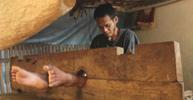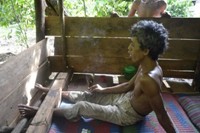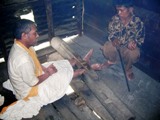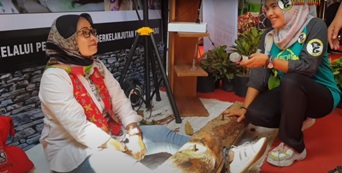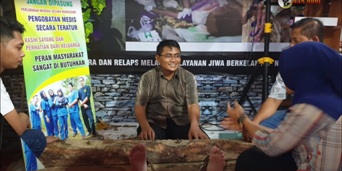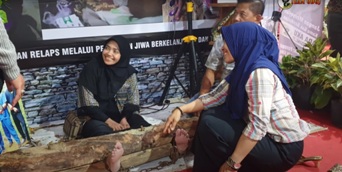 Indonesia. Yet it is the only region with only one mental health hospital, which is located in the provincial capital.
Indonesia. Yet it is the only region with only one mental health hospital, which is located in the provincial capital.
The following is an (abridged) version of an article which appeared in the Jakarta Post on 5 April 2010. The article expresses concern that the mentally ill are still being confined in stocks in Indonesia, a practice known as "pasung".
Aceh is one of the provinces with the largest number of mental health cases in
 Indonesia. Yet it is the only region with only one mental health hospital, which is located in the provincial capital.
Indonesia. Yet it is the only region with only one mental health hospital, which is located in the provincial capital.
Minimal public education and awareness has led to many families in Aceh deciding to keep their family members with mental health problems in stocks.
According to the Aceh Health Office, 289 people today are being held in the stocks by their families because of their mental condition. This figure excludes those not reported to the local government.
“There’s a stigma in Aceh society that makes families affected by mental disorder feel embarrassed,” said Syarifah Yessi, head of the trauma counselling section at Aceh Health Office. She said the stigma prompted most people to hide their family members suffering from mental illness by confining them in the stocks. They usually come from poor families that cannot afford to pay hospital costs continuously. Their condition is worsened by their family’s ignorance of the disorder.
“Those put in the stocks always end up entering psychiatric institutions. And this does not guarantee a full recovery either, unless their families or local communities know how to handle and interact with the mentally ill patients,” explained Syarifah.
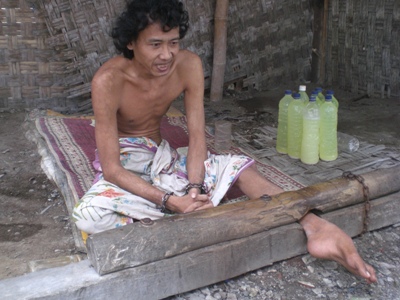 Director of the Aceh Mental Hospital Saifuddin A.R. also described family and community involvement as a crucial factor in encouraging the recovery of people with mental health problems. Ideally, the public should change its attitude toward people with mental disabilities, while having an awareness and basic knowledge of community mental health.
Director of the Aceh Mental Hospital Saifuddin A.R. also described family and community involvement as a crucial factor in encouraging the recovery of people with mental health problems. Ideally, the public should change its attitude toward people with mental disabilities, while having an awareness and basic knowledge of community mental health.
“A mental health hospital has a limited capacity. At present, our capacity is only between 220 and 300 patients,” said Saifuddin. According to him, most of the mentally traumatized people now being kept in the stocks are patients who have already been treated at the hospital. But owing to improper care and handling by their families, many of them have had to enter and then leave the hospital in Banda Aceh.
Putting people with mental problems in the stocks has become a short-cut frequently applied by Aceh communities of late. In nearly all regencies in Aceh, this method is applied by families to deal with their members with severe mental disorders.
“It cannot heal the disorder but rather it increases stress and worsens the mental condition of the sufferer,” added Saifuddin. "In addition, the use of stocks is banned under the 2002 law on public health, which stipulates that people with mental disorders shall not be subjected to confinement in the stocks. This technique is not a solution or a cure, but rather a torment that imposes greater suffering and mental confusion."
The situation has not improved. A report by Human Rights Watch in 2016, entitled "Living in Hell", provides a grim portrait of Indonesia’s neglect and abuse of its mentally ill population. It pays particular attention to the practice of pasung - placing those with “real or perceived psychosocial disabilities” in stocks or shackles, a practice which persists across the country despite it being banned by the government some years earlier. According to the report, 18,000 Indonesians are currently live in pasung, with viable mental health care alternatives either inaccessible or non-existent.
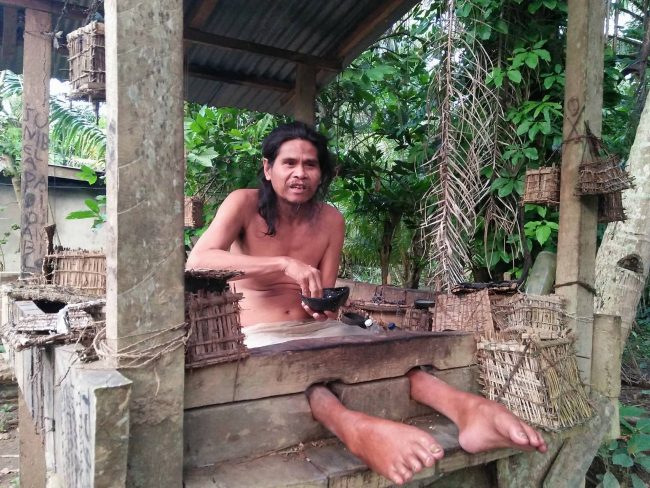 The report notes that "the culture of mental health care in Indonesia relies heavily on backward pseudo-science rooted in dated spiritual traditions". The report’s authors observe a “widespread belief that mental health conditions are the result of possession by evil spirits or the devil, having sinned, displayed immoral behaviour, or lacking faith". (In Indonesia, many also condemn homosexuality as a mental disease.) Because of the stigma that shrouds mental illness, families tend to deliver their sick loved ones not to medical treatment but to spiritual healers.
The report notes that "the culture of mental health care in Indonesia relies heavily on backward pseudo-science rooted in dated spiritual traditions". The report’s authors observe a “widespread belief that mental health conditions are the result of possession by evil spirits or the devil, having sinned, displayed immoral behaviour, or lacking faith". (In Indonesia, many also condemn homosexuality as a mental disease.) Because of the stigma that shrouds mental illness, families tend to deliver their sick loved ones not to medical treatment but to spiritual healers.
Pasung is a hallmark of this method of “treatment.” In these cases, patients are constrained, often naked, in stocks or chains. Sometimes they are left outside for extended periods of time, which can be years. The Human Rights Watch report estimates that as many as 57,000 people in Indonesia - nearly 15% of all seriously mentally ill people in the country — have been subjected to pasung at least once (the figure is higher in rural regions).
On paper, the Indonesian government condemns this practice as inhumane. The country’s Health Ministry undertook to completely eliminate pasung from the country by 2020. Whether or not it achieves that aim remains to be seen.
Here are some more examples of pasung in Indonesia. I have not shown some of the more distressing pictures.





